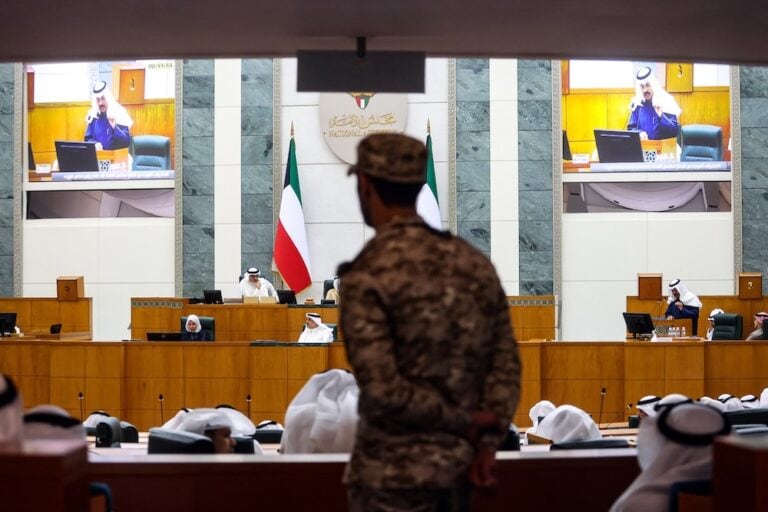MORE KUWAITI WRITERS SENTENCED TO PRISON Another Major Setback for Kuwaiti Freedom of Expression (New York, January 25, 2000)–Human Rights Watch today expressed deep concern about a Kuwaiti court ruling sentencing two women novelists and a publisher to prison for publishing “indecent” writings. The January 22 ruling is the latest in a series of cases […]
MORE KUWAITI WRITERS SENTENCED TO PRISON
Another Major Setback for Kuwaiti Freedom of Expression
(New York, January 25, 2000)–Human Rights Watch today expressed deep concern about a Kuwaiti court ruling sentencing two women novelists and a publisher to prison for publishing “indecent” writings. The January 22 ruling is the latest in a series of cases brought by Kuwaiti
Islamists against journalists, commentators, and academics for expressing controversial views on religious and political themes.
“Kuwait used to be an island of relative openness in the Middle East,” said Hanny Megally, executive director of Human Rights Watch’s Middle East and North Africa division. “This ruling marks yet another major setback to freedom of expression in Kuwait and in the region.”
The court sentenced Kuwait University professor of philosophy Dr. `Aliya Shu`ayb; her publisher, Yahia al-Rubay`an; and Laila al-`Othman, a novelist, to two months in prison for writings that the court said “included expressions that violate God, and indecent and shameless expressions.” The ruling did not specify what those expressions were. In an interview in al-Hayat newspaper on Sunday, al-`Othman said that she had obtained affidavits from professors of Islamic Law attesting that her poem did not touch on religion, but the court ignored the affidavits.
In addition to the prison sentences, Shu`ayb and al-Rubay`an were each fined 100 Dinar for publishing and distributing Shu`ayb’s book of poetry, Spiders Bemoan a Wound, without a permit. All three have appealed the ruling and are out on bail. An appeal court is expected to hear the case in February.
Kuwait University professor Dr. Ahmad al-Baghdadi was sentenced to one month in prison in a similar case in October 1999. The court found that his article in a student newspaper defamed Islam by contending that the prophet Mohammed had failed to convert non-believers during his time in
Mecca. He was later pardoned due to poor health. Other rulings in 1999 have resulted in journalists being fined and publication of their magazines and newspapers ordered suspended.
Kuwait’s Press and Publications Law makes it a criminal offense to publish materials that violate “by allusion, slander, sarcasm, or disparagement, God or the prophets or the companions of the prophet Mohammad,” or “sully public morals.” A similarly vague article in the Criminal Code mandates prison sentences for the dissemination of “opinions that include sarcasm, contempt, or belittling of religion or a religious school of thought.” Vaguely-worded provisions unduly infringe upon the rights to free expression in the International Covenant on Civil and Political Rights (ICCPR). Article 19 of the ICCPR guarantees all individuals the “freedom to seek, receive and impart information and ideas of all kinds.” Kuwait acceded to the ICCPR on May 21, 1996.
“This kind of legislation provides an opening for the arbitrary prosecution of almost any kind of speech or writing,” Megally said. “It isn’t enough to hope the courts will protect freedom of expression. The government has to change the law.”
Human Rights Watch called on the Kuwaiti government to take immediate action to repeal all articles in Kuwait law that contravene international human rights law as set forth in the Universal Declaration of Human Rights and the International Covenant on Civil and Political Rights.


